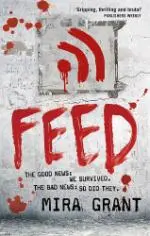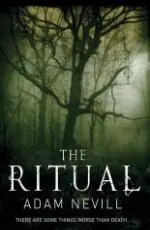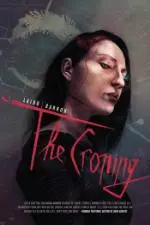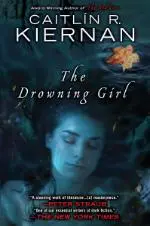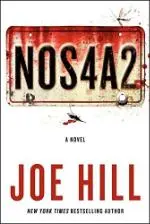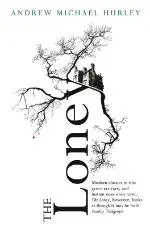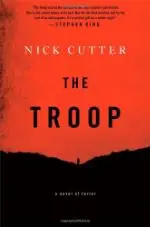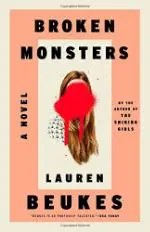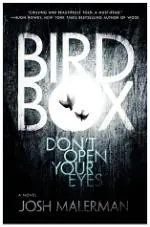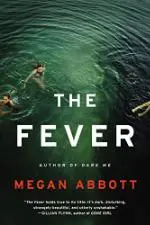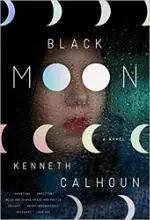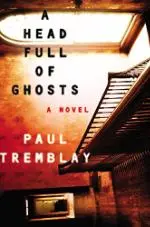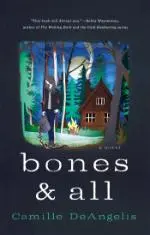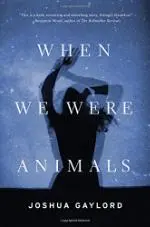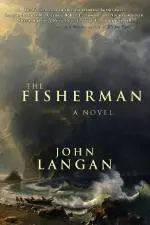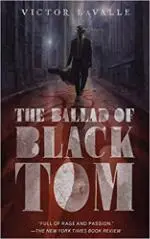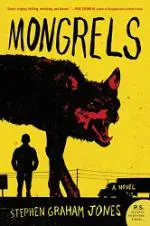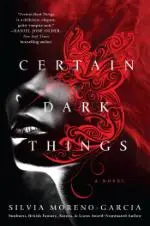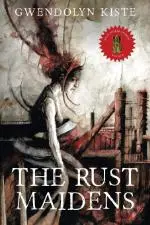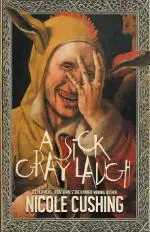RIP 2010-2019. You've been a rather strange decade, and not exactly a stellar one, if we're being honest, especially these last three years, what with basically every celebrity dying in 2016 (we're living in a world without David Bowie and Prince, y'all) and then that one thing concerning the White House we all just avoided discussing with our families at Thanksgiving, even though it's the epitome of a shit show at this point (yeah, call me a libt*rd snowflake, I really don't care).
But as godawful as the '10s have been in certain areas, they've been pretty wonderful in others. Personally speaking, I celebrated ten amazing years with my lady, with whom I also joined matrimonially in 2017, and our relationship significantly outweighs all the awfulness in the world, hands down. Additionally, there's been some great movies, great music, and—the reason we've gathered here today—some outstanding horror novels to come out of the decade. Here are my personal top twenty picks, listed in (mostly) chronological order.
![]() 1. "Feed" (2010) by Mira Grant AKA Seanan McGuire
1. "Feed" (2010) by Mira Grant AKA Seanan McGuire
Nearly ten years on, this zombie novel from Seanan McGuire, writing under the pen name Mira Grant, seems like it could've been published just last month. It deals with a conspiracy (SPOILER) devised by a Republican politician to further propagate faith-based doctrines into American democracy. It's the kind of social commentary George Romero, king of the zombies, loved to inject into his narratives–commentary that is both reflective of the time in which it was written, but also universal in its scope, making it timeless.
![]() 2. "The Ritual" (2011) by Adam Nevill
2. "The Ritual" (2011) by Adam Nevill
Horror movie aficionados ranked the Netflix adaptation of this novel as one of the best horror films of 2017, but Nevill's original text is really the definitive version of this narrative. Why? Let's just say "old-god-worshipping teenage metal heads" and leave it at that. The Ritual is also one of the first in the new wave of folk horror titles, a trend that's still as strong at the end of the decade as it was in the beginning, and one that carries on the time-honored tradition of presenting civilized, privileged people going into the woods and having no goddamn clue what they're doing.
![]() 3. "The Croning" (2012) by Laird Barron
3. "The Croning" (2012) by Laird Barron
If one were to construct a list of the best horror authors of the last decade, Barron would certainly appear there, as his wealth of short stories are among the best of the cosmic neo-Lovecraft set. But while Barron is a decidedly more prolific short story writer, this does not mean his first novel (or second, depending on how much of a word-length guardian you are) packs any less of a wallop. It all hinges on the basic idea that knowledge might not exactly equal power, or, rather, that certain knowledge comes with a price that most of us are unwilling to pay. More horrifying still is the idea that we've been unwittingly making payments to a wealth of knowledge we don't actually want to possess, knowledge that will categorically rip our minds to shreds once all the pieces of the puzzle are in place.
![]() 4. "The Drowning Girl: A Memoir" (2012) by Caitlín R. Kiernan
4. "The Drowning Girl: A Memoir" (2012) by Caitlín R. Kiernan
Kiernan is a wonderful writer period, and this tale, of a schizophrenic woman sorting out her memories and hallucinations, is certainly one of her best. The author leans in to the "unreliable narrator" technique here, but does so not to manipulate the reader, but rather to situate us directly into the core of her protagonist's fear. What actually happened and what didn't hardly matters; it isn't up to us to sort out reality and fantasy. Rather, it is the emotional journey of the narrative, the impact it makes upon protagonist and reader in kind, that truly counts here.
![]() 5. "NOS4A2" (2013) by Joe Hill
5. "NOS4A2" (2013) by Joe Hill
Prior to the release of this third novel, Hill had already been exposed as Stephen King's son, so NOS4A2 was the first of his books to fully embrace his literary parentage, which allowed Hill's imagination to run wild. This unfettering of his creative prowess resulted—perversely, one may argue—in a novel that was far, far less King, one hundred percent Hill, with its iconic protagonist and antagonist, Vic and Charlie Manx, respectively, as well equally iconic supporting players Maggie Leigh and Bing Partridge. Vampires, serial killers, psychics, inter-dimensional travelers, and Christmas will never look quite the same.
![]() 6. "The Loney" (2014) by Andrew Michael Hurley
6. "The Loney" (2014) by Andrew Michael Hurley
Another great example of folk horror, this one of the quieter, more menacing, deeply English variety. It is also a tale of terror from the point of view of a child, and one of the finest of this narrative subset, right up there with Stephen King's It and John Ajvide Lindqvist's Let The Right One In. It's chilly atmospherics and creeping dread will leave you shivering to the very last page, and long after that as well.
![]() 7. "The Troop" (2014) by Nick Cutter AKA Craig Davidson
7. "The Troop" (2014) by Nick Cutter AKA Craig Davidson
Stephen King has given his stamp of approval on numerous titles on this list, but perhaps none more so than this novel: "The Troop scared the hell out of me, and I couldn't put it down. This is old-school horror at its best. Not for the faint-hearted, but for the rest of us sick puppies, it's a perfect gift for a winter night." The book is basically Lord of the Flies meets Cabin Fever. It's nasty, but it's also poignant and overall reads like a fever dream come to manic, literary life.
![]() 8. "Broken Monsters" (2014) by Lauren Beukes
8. "Broken Monsters" (2014) by Lauren Beukes
A stunning conglomeration of detective mystery and supernatural horror, this fourth novel from Beukes is both a page-turner and an earnest look at the people making the most of their lives in dilapidated, poverty-stricken Detroit. The best novels always say a little something about the environment from which they spring, and Broken Monsters is no exception. It also features some deeply unsettling, Thomas Harris-level imagery that you won't soon forget.
![]() 9. "Bird Box" (2014) by Josh Malerman
9. "Bird Box" (2014) by Josh Malerman
It seems there's not much more than can be said about Bird Box, hands down one of the best horror novels not only of the past ten years, but of the 21st century and, really, of all time. It's one of the best examples of "less is more" and Lovecraft's insistence that the most horrifying thing in the world is the unknown. Because the characters in the narrative can't look at the apocalyptic monsters destroying the world, neither can the reader, allowing our own imaginations to torment us—and that's far more terrifying than anything the author could have put down on the page.
![]() 10. "The Fever" (2014) by Megan Abbot
10. "The Fever" (2014) by Megan Abbot
Are a group of teenage girls in a small midwestern town experiencing some kind of mass hysteria, or is there something truly unexplained going on? This question plagues every page of Abbot's superb novel, though not always in a persistent, feverish way; more often than not, the mystery haunts the characters (and the readers) with whispers that cause the hairs on the back of the neck to stand on end.
![]() 11. "Black Moon" (2015) by Kenneth Calhoun
11. "Black Moon" (2015) by Kenneth Calhoun
Prior to 2010, zombie narratives were still a relatively underground, niche subset of horror; then The Walking Dead came along and suddenly everyone and their mother loved the undead shamblers. Over-saturation ensued, and it became mandatory that writers offer their readers something different. Calhoun manages this task beautifully by creating a zombie narrative that isn't about the undead or victims of a virus; instead, Black Moon is about widespread, severe insomnia. Yes, the zombies here are just crazed, sleep-deprived maniacs. And while this premise creates some truly disturbing scenes, Calhoun is more concerned with the psychological and emotional impact this disease has on the uninfected, as well as examining the effects of an increasingly over-stimulated society. My LitReactor Review of Black Moon.
![]() 12. "A Head Full Of Ghosts" (2015) by Paul Tremblay
12. "A Head Full Of Ghosts" (2015) by Paul Tremblay
Tremblay is a master of keeping the supernatural just at the periphery of vision, like shadow figures lurking just out of the corner of your eye, and he's in top form here. Are the demons (or poltergeist, or ghosts) the real deal, or are they just figments of a collection of disturbed minds? The jury remains out through most of the narrative, but you better believe Hollywood types will show up to exploit the matter. A true modern horror masterpiece.
![]() 13. "Bones & All" (2015) by Camille DeAngelis
13. "Bones & All" (2015) by Camille DeAngelis
This novel beautifully grasps what it's like to feel like a total outsider, someone who doesn't really have a tribe, someone who doesn't much like the tribe they belong too, someone who just doesn't belong in this world at all. A work of almost heartbreaking relatability for anyone who knows loneliness, even if the protagonist gobbles up people and, as the title suggests, leaves no trace of them whatsoever.
![]() 14. "When We Were Animals" (2015) by Joshua Gaylord
14. "When We Were Animals" (2015) by Joshua Gaylord
Much like the wonderful horror film Ginger Snaps, When We Were Animals draws a comparison between puberty (or any other benchmarks demarcating youth and adulthood) and lycanthropy. Only in Gaylord's work, the kids who "go wild" around the onset of their teen years aren't exactly werewolves, though they're not exactly human either during this period, known as "the breach." Lumen Fowler is a late-bloomer, and we feel for her as the pariah she quietly becomes among her peers...only Lumen might not be so innocent. This is the kind of novel that may just be impossible to film, meaning it might stay underground for quite some time, and that's a goddamn shame.
![]() 15. "The Fisherman" (2016) by John Langan
15. "The Fisherman" (2016) by John Langan
A novel of sorrow, grief, male bonding, strange towns, and eldritch gods, this novel will crush you, dizzy you, and chill you to the bone. Cemetery Dance writer David Simms sums up the novel perfectly: "Imagine, if you will, a dark tale co-written by Peter Straub and Thomas Ligotti, filtered through the whimsical sensibilities of Neil Gaiman and spoken to a friend over beers at a campfire." Winner of both the Bram Stoker Award for outstanding achievement in a novel and the This Is Horror best novel of of the year award, and with good reason.
![]() 16. "The Ballad Of Black Tom" (2016) by Victor LaValle
16. "The Ballad Of Black Tom" (2016) by Victor LaValle
Lovecraft inspired several of the works on this list, and there's no denying his impact on the world of horror fiction. But he was also a racist dickhead, a fact certain fanatic Lovecraft lovers get really mad about, if it's brought up in their presence. He's a problematic figure, especially for writers of color who integrate aspects of Lovecraft into their own work. Some simply ignore the author's abhorrent beliefs, but Victor LaValle tackles it head by retelling one of Lovecraft's most hate-fueled works, "The Horror At Red Hook," from the perspective of a black man. It's the perfect example of how writers can separate the man from his work while also telling the man (now deceased, of course) to fuck off.
![]() 17. "Mongrels" (2016) by Stephen Graham Jones
17. "Mongrels" (2016) by Stephen Graham Jones
While When We Were Animals offered a wonderful take on the werewolf narrative without featuring actual werewolves, Stephen Graham Jones goes all-in with for-real lycanthropic monsters. Except, they're not monsters; they're a family, perhaps not perfect people, but certainly regular people, Native Americans just trying to get by, and the young, unnamed narrator idolizes them. We spend ten years with this boy, from age seven to seventeen, as he prepares for his first transformation, writing down everything about werewolves he learns. Stephanie Meyer may have appropriated (and thus tainted) the concept of Native American werewolves, but in Graham Jones's hands, it's one of the most wonderful things you'll ever read.
![]() 18. "Certain Dark Things" (2016) by Silvia Moreno-Garcia
18. "Certain Dark Things" (2016) by Silvia Moreno-Garcia
In her NPR review of Certain Dark Things, author and journalist Amal El-Mohtar gives praise to Silvia Moreno-Garcia's portrait of Mexico City: "It would have been a simple matter to give in to the gravity well of stories around Mexico City, fetishize it, make it into something to draw tourists or elicit smug thrills, render it in a way that people would write up as 'exotic'—but Moreno-Garcia shows us, instead, a lived-in place, a place for her characters to know and navigate completely outside an Anglo gaze... And then there are the vampires." But these aren't like any bloodsuckers you've encountered before, primarily because they're born, not made, and they serve as a metaphor for xenophobia and bad immigration policies, which is most certainly a topic still relevant nearly four years later.
![]() 19. "The Rust Maidens" (2018) by Gwendolyn Kiste
19. "The Rust Maidens" (2018) by Gwendolyn Kiste
This novel sticks with you, long after you've read the final words. It's body horror—specifically, teenage girls inexplicably transforming into creatures of rusty metal and other detritus—combined with a depressingly realistic glimpse into the lives of middle class folk in Cleveland, all wrapped up in a coming-of-age story that hinges on hope rather than cynicism—a message we sorely need here at the end of this tumultuous decade. Kiste's debut will break your heart, then rebuild it anew.
![]() 20. "A Sick Gray Laugh" (2019) by Nicole Cushing
20. "A Sick Gray Laugh" (2019) by Nicole Cushing
This novel is so many things: a mock memoir that just might actually be semi-autobiographical; a history lesson with events both real and made-up; a bit of epidemiology attempting to cure what Noelle Cashman (the author's authorial alter-ego) calls Grayness, a disease of malaise and complacency that, in her mind, explains our current political and sociological climate; and a full-blown manifesto advocating for cults as a means of reinvigorating society. In other words, it's pretty damn weird and loaded with mind-fuckery. My LitReactor review of A Sick Gray Laugh.
As with any list of this nature, there are plenty books that didn't quite make the cut, and I'm sure there are plenty here that will raise some eyebrows. But let's not fight about it, let's discuss. What are your favorite horror books of the last decade?

About the author
Christopher Shultz writes plays and fiction. His works have appeared at The Inkwell Theatre's Playwrights' Night, and in Pseudopod, Unnerving Magazine, Apex Magazine, freeze frame flash fiction and Grievous Angel, among other places. He has also contributed columns on books and film at LitReactor, The Cinematropolis, and Tor.com. Christopher currently lives in Oklahoma City. More info at christophershultz.com
